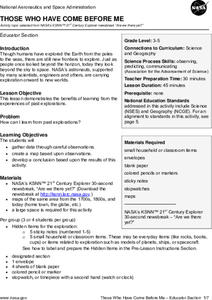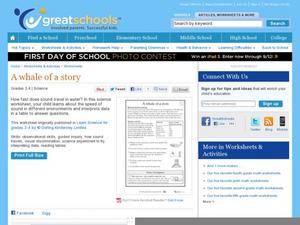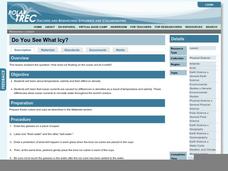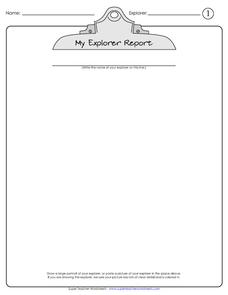Poetry4kids
Simile and Metaphor Lesson Plan
Similes and metaphors are the focus of a poetry lesson complete with two exercises. Scholars read poetry excerpts, underline comparative phrases, then identify whether it contains a simile or metaphor. They then write five...
NASA
Keeping Nine Eyes on the Weather
Take a look at climate change from another angle. Readers learn about the MISR instrument on the Terra satellite and how it studies Earth. Pupils experience how the multiple cameras give scientists multiple views so they can better study...
Curated OER
Turning the Tide on Trash: Marine Debris Curriculum
Six different lessons comprise this unit on marine debris. Science, language arts, social studies, and art projects make this an ideal interdisciplinary unit. The result will be well-informed future citizens who can help make a...
Curated OER
My Wet Robot
After hearing about the 2006 PHAEDRA mission that explored the Aegean Sea, middle schoolers work in groups to create a robotic vehicle. They must consider power, propulsion, and other vital systems. Use the multitude of external...
Curated OER
The Roving Robotic Chemist
Junior oceanographers and underwater geologists describe the four major steps of mass spectrometry. They compete in small groups to simulate the tracking of a deepwater methane plume using imaginary autonomous underwater vehicles. Give...
Curated OER
Those Who Have Come Before Me
Class members are transformed into explorers as they work in groups to locate hidden items and map their journey along the way. They then leave clues for other groups of students to follow, and ultimately discover how past explorations...
Curated OER
Incorporating 3D Visualizations into Your Classroom
Middle schoolers make observations through 3-D visualizations. They explore scientific and geologic processes through the use of 3-D pictures.
Wilderness Classroom
Pollution
Educate scholars on pollution—air, water, and land—with a series of lessons that begin with a thorough explanation of each type. Learners then take part in three activities to reinforce the importance of reducing pollution. They...
Curated OER
Earth's Water: A drop in your cup
Students complete activities where they observe the amount of freshwater in the world as a fraction of the actual amount of water using different mixtures. In this freshwater lesson plan, students brainstorm on how to preserve...
Curated OER
Water Cycle Reading and Writing
Here is a great way to get pupils to express a scientific concept in a fun way. After hearing the story of Walter the Water drop and learning facts about the water cycle, the class will write a creative expository piece describing what...
Curated OER
Plankton in the Air
Here is a lab activity adequate for use with any full lesson plan on environmental factors that shape animal adaptations or marine animal characteristics. Pupils will discuss the role plankton plays in the environment and filter-feeding...
K12 Reader
Natural Resources
What natural resources are available in your area? Your learners can consider this question after reading a brief passage about natural and renewable resources. After reading, class members respond to five questions related to the reading.
K12 Reader
Eastern Woodland Natives
Supplement your social studies instruction with a reading passage about the Eastern Woodlands. After reading the passage, learners respond to five related questions.
K12 Reader
Water Cycle
solid, liquid, and gas. The three different forms of water are the subject of the article used to assess reading comprehension. After reading the article, kids respond to a series of comprehension questions based on the text.
Curated OER
Finding the Main Idea
Thar she blows! An excerpt from Herman Melville’s Moby Dick provides the text for an exercise in finding the main idea. After recording the main idea of the passage, readers also provide two supporting ideas. An answer key is provided.
Curated OER
Poems: Identifying Patterns
Here is a great worksheet that contains two short poems to compare and contrast. Children will read each poem out loud and then complete three comparative analysis questions which focus on rhyme, structure, and language. Note: The...
Curated OER
A Whale of a Story
Does sound travel faster in water or in the air? Put the question to the test with a science experiment. After reviewing a table of data, third and fourth graders decide which statements are true and which ones are false. The bottom of...
Worksheet Web
Let it Snow
After reading an informational text detailing the ins and outs of snowflakes, scholars draw their own special design then work cooperatively to role play a snowman building scenario.
Polar Trec
Do You See What Icy?
Here is a lesson that kicks off with a question. "How does ice floating on the ocean act as it melts?" As learners investigate this natural phenomenon, they'll discover that it has a lot to do with temperature, salinity, and the effect...
Curated OER
Ecological Cycles Part 1
Knowing about the hydrologic cycle is the first step to understanding the carbon cycle. Upper graders discuss the earth's water content, polar ice caps, and the concept of the ecological cycle as it applies to carbon, nitrogen, and other...
Illustrative Mathematics
Mile High
What is the meaning of sea level? This resource helps your class understand the meaning of elevations above, below, and at sea level. Provides for good discussion on using positive and negative numbers to represent quantities in the real...
University of Miami
What is it? Weathering, Erosion, or Deposition?
Just as rocks move through the rock cycle, your giddy geologists will move descriptions around until they are all in the correct category. After cutting out several types of rock movement, learners determine whether the action is...
Super Teacher Worksheets
My Explorer Report
This is the perfect resource to accompany your class project on famous explorers! Learners detail basic information about their chosen explorer, his/her main events of exploration and means of transportation, and finally,...
Humanities Texas
Primary Source Worksheet: Excerpt from Reagan's Farewell Address
Here's a worksheet designed to help learners develop their skill reading primary source documents. The questions, based on an excerpt from Ronald Reagan's Farewell Address, encourages close reading and analysis.
Other popular searches
- Identify Oceans and Seas
- Oceans and Seas Maps
- Oceans and Seas Preschool
- Balm Oceans and Seas
- Oceans and Seas Worksheet
- Blm Oceans and Seas
- Major Cities/oceans/seas























